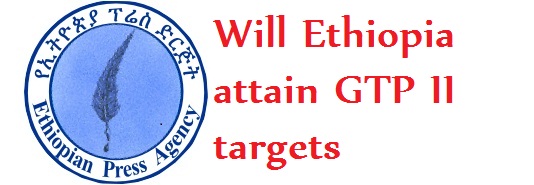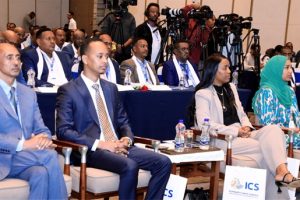
The second Growth and Transformation Plan (GTP II) targets have optimistically been perceived as attainable if the ongoing inclusive reforms continue in solidifying the steady macro-economic state of affairs, officials and professionals asserted.
According to the Mid-term Macroeconomic Performance Review, the Ethiopian economy, measured in terms of its Gross Domestic Product (GDP), grew in average by 8.6 per cent which comprises the performances of the three years, from 2015/16, to 2016/17 fiscal years.
The GDP growth by major economic sectors represents 10.2 per cent in 2014/15, 8.0 per cent in 2015/16 and 10.9 per cent in 2016/17 fiscal years, the report highlights.
Dr. Fitsum Asefa, Commissioner for the National Planning Commission, told The Ethiopian Herald that though Ethiopia’s economic growth has been broad based and pro-poor, it has the capacity to create jobs and reduce poverty in the country.
Job creation and poverty reduction, through promoting more inclusive growth, will continue to be among the key priorities of the government during the remaining years of GTP II, Dr. Fitsum said.
Despite some challenges, the economic progress in the first three years has been encouraging in terms of maintaining the overall and macroeconomic growth and stability, she highlighted.
According to her, the merchandise export revenue, railway infrastructure, the rural roads, energy infrastructure, urban housing development, and tax revenue are among the sectors which register shortfalls in the implementation of the five year plan.
In this regard, intensive consultations have been held with higher officials of the respective ministerial offices to identify the reasons behind the low performance of these sub-sectors, Dr. Fitsum said.
adding that the ministries need to continue exerting maximum effort to achieve the target set for the remaining two years, she highlighted.
Dr. Fitsum also said that Ethiopia is currently pursuing far-reaching reforms in the political, social and economic domains since Prime Minister Dr. Abiy assumed power in early April. This will hopefully inspire utmost contribution of every stakeholder to improve the macroeconomic performance, she predicted.
In fact, stabilizing the political situation, maintaining the law and order, and supporting the reform measures have so far focused on improving the economic performance, fighting corruption, improving good governance, and laying the ground work for the country’s democratization, Dr. Fitsum noted.“The economic and institutional reforms being undertaken are expected to enhance the engagement of both domestic and foreign private investors in our economy. These inclusive reforms will further facilitate the implementation of GTP II in the remaining few years,” Dr. Fitsum stressed.
“Complementing the financial sector with technology, establishing capital market, and introducing e-commerce, improving the provision of logistic services are among the key priority of the government and an enabling environment to lure foreign direct investment.”
Dr. Christian Rogg, Head of UK DFID Mission, told this writer that GTP II goes some way to address inclusive development to ensure no one left behind, through focusing on food security and building a national social protection system.
Dr. Christian also said that Ethiopia has an optimistic track record in delivering human development results.
For him, human capital challenges in health, education and nutrition are some of the constraints to realize the growth and transformation journey. Though particular challenges are emerging in ensuring equity for all citizens, the government must strengthen the resilience of the pastoral communities, according to Dr. Christian.
“The government has achieved impressive results in terms of the country’s road network. This has been a key enabler for those living in the most rural communities to have greater access to markets and services.”
For GTP II to be successful, Dr. Christian advised that the government ought to mobilize all means and all actors – not only state and public administration, but also citizens, the private sector and civil society.
Having huge human resource, the country is optimistically very well positioned to achieve the second GTP goals. Maintaining its economic progress made over the last three years amid socio-political challenges, it is more likely to meet the desired goals if peace and stability cherished across the country, Dr. Christian hoped for.
An economic expert from the Federal Commerce and Sectoral Association, Zelalem Leyih commented that if every stakeholder is part of the solution in alleviating poverty and empowering development actors, it is undeniable to achieve the planned target relied on sustainable development.
According to Zelalem, the participation of the private sector is growing from time to time, but there are still gaps in investing in productive sectors that are crucial to bringing about economic transformation.
Zelalem also advises that it is vital to improve the saving culture of citizens with new saving schemes, and expand the branches of financial institutions to the remote parts of the country.
Herald December 15/2018
BY ZELALEM GIRMA





